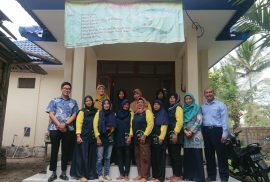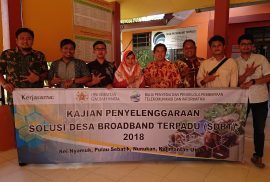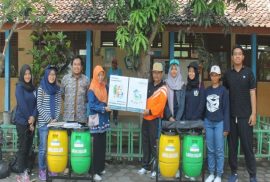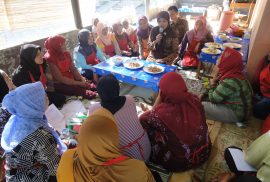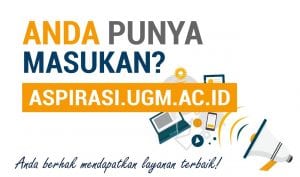Padukuhan Temanggal II located in Purwomartani Village, Kalasan District Sleman Regency is an area with very good potential for implementation of economic activities, particularly agriculture and fisheries. Except for farming/paddy field, Purwomartani also have a big potency in aquaculture or fish farming since the area has a good irrigation and water supply. Kelompok Wanita Tani or Women Farming Group answer the potencies by inviting Bachelor in Fish Product Technology (BFPT) to guide and train the group to utilize their surrounding yard as fish pond and further process the fish into value added product. For this program, BFPT conducted a series of training to teach a good fish processing methods. In the first training, the women group were exposed by the potency of fish as a food source, the kind of processing and fish products, good manufacturing practices, the zero waste processing concepts, economical value of products, and group institution development. In the second training, BFPT gave a processing practice for fish processing especially for dried base products.
Community Development
UPI Sari Mina is an intermediate level fish processing unit located in Sempu, Pakembinangun village, Pakem district, Sleman Yogyakarta. UPI Sari Mina is a joint venture group of women residents in Sempu who has been engaged in processing shredded fish since 2009. The main product of UPI Sari Mina is shredded fish made from catfish, tuna and salmon mixed with lemadang. Every month, UPI Sari Mina processes about 4 quintals of catfish, 8 quintals of tuna, and 60 kg of salmon to be used as a variety of floss. The problem faced by the processing group was production waste in the form of untapped skin, bones and heads. For this reason, the Service Team for the Fisheries Product Technology Study Program carried out a service program in the form of technology transfer and training in bone and fish skin waste processing in October-November 2019.
Indonesia, which is an archipelago, still has many communication problems that must be resolved. One of these problems is the unequal access to internet, especially in 3T areas (underdeveloped, frontier, outermost). The 3T regions, which are directly adjacent to neighboring countries, often have limited access compared to other regions in Indonesia – these areas should have priority facilities to make it easier to get information from the Government of Indonesia. The Integrated Broadband Village Solution Program (SDBT) from the Ministry of Communication and Information Technology in collaboration with UGM, is holding pilot projects in several 3T locations to ensure that the internet network can be reached by the community properly. To maximize the benefits of the internet, the use of information technology is accompanied by piloting in the fields of agriculture and fisheries, so that information relating to these two fields can be directly felt by the community in the 3T area.
The Education Sustainable Development activity entitled “Growing Love for the Environment towards a Sustainable Ecosystem Protection System” was held in May-August 2017 at Trisik Elementary School which is located in the coastal area of Trisik Beach. This activity aims to provide an understanding of the importance of the coast and its preservation to early childhood in school with the hope of growing awareness of the benefits and potentials that exist in their environment, and how to practice environmental awareness and preserve it into the future.
Pawon Gendis Women Farmers Group is one of the women farmer groups in Banjarharjo Village, Kalibawang District, Kulon Progo Regency Yogyakarta which was founded in 2013 with the main objective to process local food sources to support food security in Kulon Progo Regency. Together with 42 members, Pawon Gendis has succeeded in having the superior product ‘Manihot’ made from cassava with a PIRT (house hold processing certification) and halal distribution permit from LPOM MUI. Apart from agricultural products, fish based food are also easy to find in Banjarharjo – but this has not been utilized optimally. For this reason, through guidance provided by the Department of Fisheries, UGM Faculty of Agriculture, Pawon Gendis has begun to produce fish products in a good and zero waste way, so as to produce quality processed fish products to maximize the goals of women farmer groups that are able to support food security, especially in regencies. Kulon Progo
he “Mino Mulyo” Fish Cultivator Group is located in Kergan, Tirtomulyo, Kretek District, Bantul Regency, with 35 members. This group had received a Certificate of Good Fish Cultivation Methods with Good grades, from the Director General of Aquaculture in 2013. Tirtomulyo Village is starting to get attention because the location is in a strategic position, on the main route Yogyakarta-Samas or about 3 km of the planned Southern Ring Line. The existence of this route allows the development of community business opportunities, including in the form of a Culinary Tourism Complex for the Kretek area, especially in Kergan.
Ngentak in Poncosari, Bantul, Yogyakarta is located in a strategic position around Pantai Baru tourism area which has advantages including clean and shady beaches, as well as education-based ecotourism such as hatchling conservation, fisheries (shrimp ponds) and animal husbandry, and renewable energy. The “Ulam Arum Sari” , Agriculture Group, in Ngentak consists of 40 fisherwomen and fish cultivators whose main activity is to process and market fishery products in the form of culinary dishes and processed fishery products as souvenirs. The Team from Fisheries Product Technology Study Program, Faculty of Agriculture UGM conducts empowerment, training and mentoring activities for members of the KUB Ulam Arum Sari to improve skills in diversifying cultured shrimp processed that are not absorbed by the market (by product) or do not meet the criteria for shrimp raw material (rejected) market. This activity was carried out in June – October 2015 with a mentoring program in the form of socialization, application of appropriate technology in the production of various processed shrimp, packaging and labeling improvements, initiation of marketing and promotion strategies, simple business analysis training, games to increase group motivation, and monitoring. and evaluation. Skills development in the knowledge of the diversification of processed shrimp products is expected to increase the independence and welfare of the community in the target group in particular and ultimately be able to move the economic wheels of Ngentak Hamlet, Poncosari for the better


